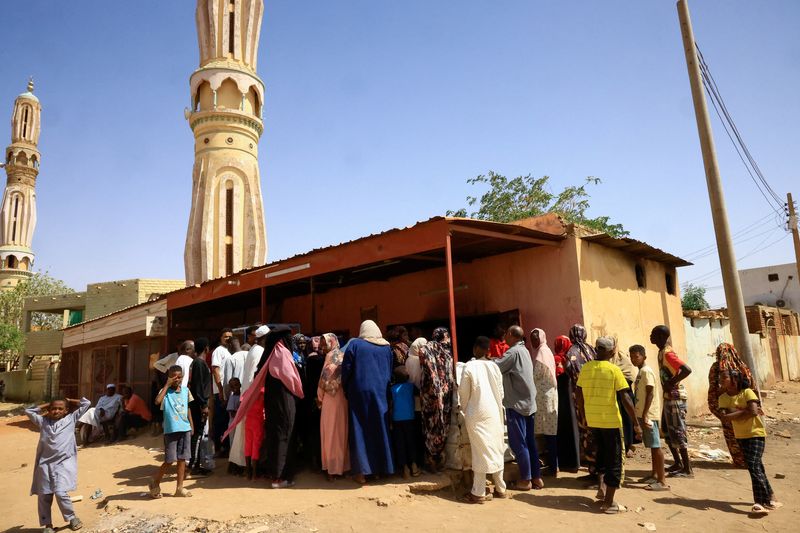Foreign states start evacuations from Sudan as battle rages
5/5

© Reuters. People gather to get bread during clashes between the paramilitary Rapid Support Forces and the army in Khartoum North, Sudan, April 22, 2023. REUTERS/Mohamed Nureldin Abdallah
2/5
By Khalid Abdelaziz, Nafisa Eltahir and Aidan Lewis
KHARTOUM (Reuters) -Some foreign nationals began evacuating from a Red Sea port in Sudan on Saturday, as air strikes again rocked the capital Khartoum after a week of fighting between rival commanders that has killed hundreds of civilians.
The bloody onslaught of urban warfare has trapped large numbers in the Sudanese capital, disabling the airport and rendering some roads impassable.
The United Nations and foreign states have urged rival military leaders to honour declared ceasefires that have mostly been ignored, and to open safe passage for fleeing civilians and the supply of badly needed aid.
With the airport closed and skies unsafe, thousands of foreigners – including embassy staff, aid workers and students in Khartoum and elsewhere in Africa’s third largest country – have also been unable to get out.
Saudi Arabia has evacuated Gulf citizens from Port Sudan on the Red Sea, 650 km (400 miles) from Khartoum. Jordan will use the same route for its nationals.
Western countries are expected to send planes for their citizens from Djibouti, though the Sudanese army has said airports in Khartoum and Darfur’s biggest city Nyala are problematic and it was not clear when that might be possible.
One foreign diplomat who asked not to be identified said some diplomatic staff in Khartoum were hoping for evacuation by air from Port Sudan in the next two days. The U.S. Embassy warned Americans that it could not assist convoys from Khartoum to Port Sudan and travel would be at individuals’ own risk.
The army, under Abdel Fattah al-Burhan and the rival Rapid Support Forces (RSF), headed by Mohamed Hamdan Dagalo, known as Hemedti, have so far failed to observe ceasefires agreed almost daily since hostilities broke out on April 15.
Saturday’s fighting breached what was meant to be a three-day truce from Friday to allow citizens to reach safety and visit family during the Muslim holiday of Eid al-Fitr. Both sides accused the other of not respecting the truce.
“I don’t have a problem with the ceasefire,” Hemedti told Al Arabiya TV late on Saturday. “They (the army) did not respect it. If they respect it, so will we.”
‘HOURS OF TERROR’
Any let-up in fighting could accelerate a desperate rush to flee by many Khartoum residents, after days trapped in homes or districts under bombardment and with fighters roaming the streets.
Residents of Khartoum and the adjoining cities of Omdurman and Bahri reported air strikes near the state broadcaster and battles in several areas including near the army headquarters.
One Bahri resident said there had been no water or electricity for a week and frequent air strikes. “We are waiting for the big fight. We are terrified of what’s coming,” she said, messaging later: “It’s started.”
Another resident, Muhammad Siddiq, from Bahri’s Shambat district, said: “We went through hours of terror today, when there were clashes and gunfire between the army and RSF inside the neighbourhood, and bullets everywhere.”
TV feeds showed a huge cloud of black smoke rising from Khartoum airport.
Medical charity Medecins Sans Frontieres (MSF) appealed for safe passage. “We need ports of entry where we can bring specialist trauma staff and medical supplies,” said MSF Sudan operations manager Abdalla Hussein.
The Sudanese doctors union said more than two-thirds of hospitals in conflict areas were out of service, with 32 forcibly evacuated by soldiers or caught in crossfire.
Beyond Khartoum, reports of the worst violence have come from Darfur, a western region that suffered a conflict which escalated from 2003 leaving 300,000 people dead and 2.7 million displaced.
A U.N. update on Saturday said looters had taken at least 10 World Food Programme vehicles and six other food trucks after overrunning the agency’s offices and warehouses in Nyala, south Darfur.
HUMANITARIAN RISK
Sudan’s sudden collapse into warfare dashed plans to restore civilian rule, brought an already impoverished country to the brink of humanitarian disaster and threatened a wider conflict that could draw in outside powers, four years after the overthrow of long-ruling autocrat Omar al-Bashir in a popular uprising.
There has been no sign yet that either side can secure a quick victory or is ready to talk. The army has air power but the RSF is widely embedded in urban areas.
Burhan said on Saturday that “we all need to sit as Sudanese and find the right way out to return hope and life,” his most conciliatory comments since fighting began.
Earlier in the clashes, he declared the RSF a rebel force, ordered it to be disbanded, and said a military solution was the only option. Hemedti said on Saturday he could not negotiate with Burhan.
Since Bashir’s overthrow and after a 2021 coup, Burhan and Hemedti held the top positions on a ruling council that was meant to hand over to civilian rule and merge the RSF into the army.
The World Health Organization reported on Friday that 413 people had been killed and 3,551 injured since fighting broke out. The death toll includes at least five aid workers in a country reliant on food aid.